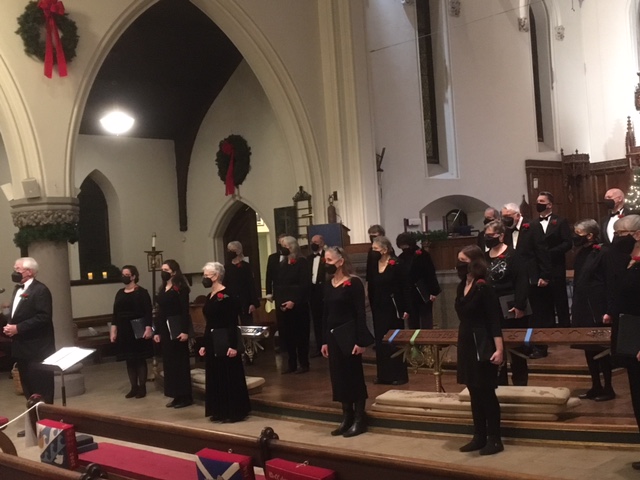In a program that combined lofty appeal with a down-to-earth sense of community, the Renaissance Voices returned for the second of two Christmas-themed performances at St. Luke’s Cathedral in Portland.
The first show, on Saturday night, had gone on in the shadow of a burgeoning snowstorm. But a large crowd dug out and came in to fill the pews on Sunday afternoon.
With last year’s holiday concert canceled because of the COVID-19 pandemic, a sense of reunion was in the air. Conductor Harold Stover expressed the group’s pleasure at being back, despite certain pandemic-driven limitations on the concert presentation and opportunities for post-event interactions with the audience.
The black-clad a cappella ensemble came ready to sing in a 45-minute, Stover-selected program that spanned centuries of vocal music compositions rooted in European sacred traditions.
Singing through masks muffled some works just a touch. A delicate “The Little Road to Bethlehem” by Michael Head (1900-1976) would be nice to hear again in full once the pandemic has passed. But the singers’ fine voices carried well enough to please ears eager to experience their take on the renowned vocal art form once again.
Some of the more exuberant selections, two pieces by Heinrich Isaac (1450-1537) for example, came across in a spirited polyphony. The “Alleluia, Vidimus Stellam” seemed to musically gaze toward the stained-glass windows high overhead in the cathedral as the nearly two dozen members of the chorus gently swayed below.
Two plainsong pieces, one sung by the men only and the other by the women, established the resonance so central to this very early form. By contrast, a recent “Ave Maria” by Kathryn Rose (b. 1980) added some harmonic twists to gently suggest how current approaches have evolved.
“O Magnum Mysterium” by Tomàs Luis de Victoria (1549-1611) gained momentum around rich melodic material while “Resonet in Laudibus” by Anselm Schubiger (1815-1888) offered a brighter lift to the proceedings.
Conductor Stover included his own “Sweet Was the Song,” a work that evoked an idyllic state much less austere and forbidding than that suggested by some of the early works in the program.
Two recitations were inserted to good effect. Kirk Read stepped forward to share May Sarton’s “December Moon,” a poem that adds a sense of wondrous mystery to its nocturnal reflections. Bernie Horowitz gave a playfully dramatic reading to the well-known tale of “Madeline’s Christmas.”
Judging from the expressions of approval rippling through the attentive crowd, another reading or two might have fit well into the all-too-brief program.
Near the close, three lesser-known Christmas carols, including a particularly lively “Blessed Be That Maid Marie,” captured the welcome seasonal spirit of celebration through song.
Steve Feeney is a freelance writer who lives in Portland.
Send questions/comments to the editors.



Comments are no longer available on this story